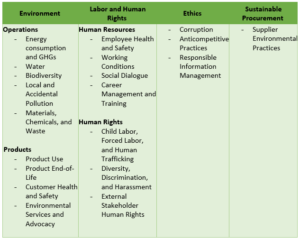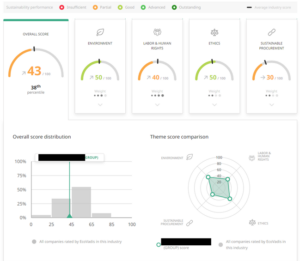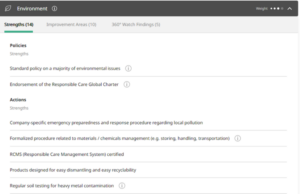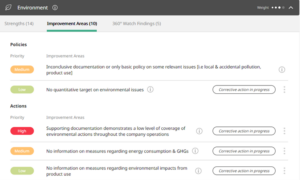Suppliers Can’t Ignore ESG Ratings Anymore: The EcoVadis Scorecard is Coming At You And This One Has Teeth
If you’re an ESG holdout either because you think the rules don’t apply to smaller, privately held companies or because you believe the SEC’s new regulations won’t ever really go into effect, it’s important to know that even if federal regulations don’t mandate reporting, someone or something else will. For many organizations, the directives are now coming from their large, public, and influential customers.
Heard of EcoVadis? If not, it won’t be long before you do, especially if your business is part of the supply chain of a larger, global, or public firm. EcoVadis is a supply chain ESG ratings firm that claims to be the only universal sustainability ratings provider. It is the first in the industry to receive unicorn status, being valued at $1 billion in its latest funding round and raising $725 million in the last three years. Clearly, the rare organization that reaches this pinnacle—others include Google and Facebook—doesn’t get there by accident. They do it with an innovative idea and a solid growth plan.
In the case of EcoVadis, this involves making sustainability reporting, ESG scorecards, and ESG improvement plans part of every company’s reality. Unlike most ESG ratings providers, the bulk of EcoVadis’ coverage is made up of smaller, often private companies that represent the majority of larger, public companies’ supply chains. Those public goliaths (think Coca-Cola, GM, JP Morgan, Nestle, Nokia, and Unilever) love the platform because, although it is highly complex, it provides a one-stop-shop for comparing and monitoring large supplier networks without taking on huge costs. As such, public giants are inundating their supplier bases with requests to use EcoVadis. Today, the platform is one of the most widely used sustainability ratings with more than 90,000 companies across more than 200 industries participating in its assessments.
You’re going to be brought into the ESG ratings world, one way or another
For major companies that publicly commit to sustainability, it’s not enough to clean up their own operations. They are increasingly responsible for ensuring their entire network—both upstream and downstream—is doing the right things from an environmental, social, and governance perspective.
However, for multinational organizations with complex global supply chains, monitoring the behavior of every individual supplier is a colossal undertaking. That’s why these big businesses are increasingly turning to the EcoVadis system, which puts the onus on suppliers to do their own data collection and reporting, and then standardizes the results to make them easy for the big companies to use.
On GM’s sustainability site, for example, the automotive giant explains its relationship with the EcoVadis systems and spells out its requests that all Tier 1 suppliers begin using the system right away. The site explains, “In 2021, we furthered our commitment to create a more sustainable supply chain by working with EcoVadis to rate and understand the sustainability performance of our supply base. EcoVadis allows us to gain visibility of the management systems suppliers have in place to support the advancement of the environment, labor and human rights, ethics and sustainable procurement.”
What to expect if you receive a request to work with EcoVadis
GM is not alone in asking its suppliers to participate in the EcoVadis sustainability assessment and ratings program. Even the smallest companies that supply just a single component or service to these corporations are receiving requests, often from multiple customers. From our experience, those that have pushed back or asked for exemptions because of their smaller status have been outright denied. In short, companies are running out of places to hide from understanding and addressing their ESG footprints. The best (and really, the only) choice appears to be for companies to commit to the effort and embrace its importance.
Here’s how:
1. Get familiar with the EcoVadis evaluation criteria. The central objective of an EcoVadis assessment is to measure the quality of a company’s corporate social responsibility (CSR) management system through its policies, actions, and results. EcoVadis evaluates these three areas based on 21 ESG criteria spread across four key themes: Environment, Labor and Human Rights, Ethics, and Sustainable Procurement.
EcoVadis Sustainability Assessment Criteria

These general topic areas are the same for all suppliers, but the individual questions can vary and are customized to the supplier’s industry, size, and location or country. It’s a good idea to become a member of EcoVadis sooner than later so you can download the questions that relate to you specifically and start assessing how prepared you are to answer them.
2. Plan to invest in the process. Suppliers can expect to pay around $2,000 annually to EcoVadis to cover the cost of the assessments, ratings, and results reports. However, the effort and internal resources required to complete the questionaries often represent a more significant investment hurdle than the money does, particularly for smaller firms.
Once you have your set of questions, take an inventory of your current ESG policies, practices, and disclosures to determine where the largest reporting gaps lie. From an environmental perspective, organizations that are already reporting using today’s most popular climate risk reporting frameworks, such as the CDP questionnaire or the Task Force on Climate-relate Financial Disclosure (TCFD) framework, will have a fairly easy time responding to EcoVadis. But those that are new to ESG can expect to spend months or longer gathering the required data. The good news is that most reporting mechanisms and frameworks ask for similar information. Once you have completed one process, you will be much better prepared to complete the others if and when you chose (or are required) to do so.
Regarding the S factor in ESG, human capital management information and diversity, equity, and inclusion (DEI) data will be the most important for suppliers to provide. EcoVadis aims to paint a picture of how companies manage and treat their workforce and just how diverse that workforce is.
3. Understand the scoring methodology. Suppliers that complete an industry-specific EcoVadis questionnaire will receive a score from 1 to 100 in each of the four key topic areas. Depending on the industry, some of these scores are weighted more heavily than others. All scores are factored into a composite or overall score. Results are then benchmarked against industry averages and the company is assigned a percentile based on how it compares to its peers. All assessment participants view supplier leaders and laggards to further understand their results.
In the example of an EcoVadis rating scorecard below, you can see that for this company, Labor and Human Rights is the most heavily weighted factor followed by Environment. The company’s composite score of 43 places it in the 38th percentile of all companies in the industry rated by EcoVadis. Based on the overall score distribution, the company can see that it falls just below the average ESG performance for its industry.

4. Know the implications of your score and commit to ongoing improvement. It is very likely that if a customer has asked you to complete the EcoVadis assessment, that customer has also established criteria for where your score needs to be and how much it needs to improve over time. Sometimes this is framed in terms of which quartile you fall within compared to others in your industry. Usually, failing to meet the criteria comes with significant consequences. For example, companies like GM are threatening to reduce or eliminate contracts with suppliers that do not meet a certain ratings threshold—typically, a minimum score of 50 in one or more of the evaluation areas.
Fortunately, suppliers receive more than a raw score in return for their efforts in completing the survey. Through each supplier’s dashboard, EcoVadis provides results that include insight into key strengths and improvement areas. These findings are delivered by key topic area. Improvement areas are further divided between the policies, actions, and results and designated as low, medium, or high priority. Through the dashboard, a company can then initiate and track corrective actions in hopes of increasing its score the following year.
In many cases, suppliers with below-average scores will be given the opportunity to demonstrate improvement before a customer withdrawals part or all of its business. Because EcoVadis essentially provides suppliers with a customized and prescriptive roadmap to improved ESG performance, suppliers have a clear and streamlined path to making the right changes, getting ahead on their ESG journeys, and keeping their valuable customer relationships intact.


At the end of the day, proper treatment of the environment and people matters to every company
Despite recent rhetoric criticizing the ESG ratings industry, the fact is that the importance of ESG scores will not deteriorate anytime soon. Public companies may soon be required to provide enhanced disclosures in their official filings. And while private companies do not need to answer to the SEC, they do have to answer to their larger corporate customers, consumers, and the public at large.
For companies that are new to ESG reporting, the EcoVadis assessment process offers a great tool for beginning to build an overall ESG strategy. Whether or not you go on to align with any of the other popular ESG frameworks, your EcoVadis scorecard and results can help you demonstrate your sustainability credentials, meaningfully differentiate your business from its competitors, and easily track and share your progress over time.
Rather than look at a customer’s ask to complete the questionnaire as a one-time, resource-intensive lift, consider the work as the foundation of an ESG strategy. And start building your business’ powerful sustainability advantage today.
If you’re interested in putting your best foot forward on your next EcoVadis assessment, give us a call. Our team can help you draft recommended policies and responses to the EcoVadis questionnaire to set you and your company’s ESG strategy up for success.

